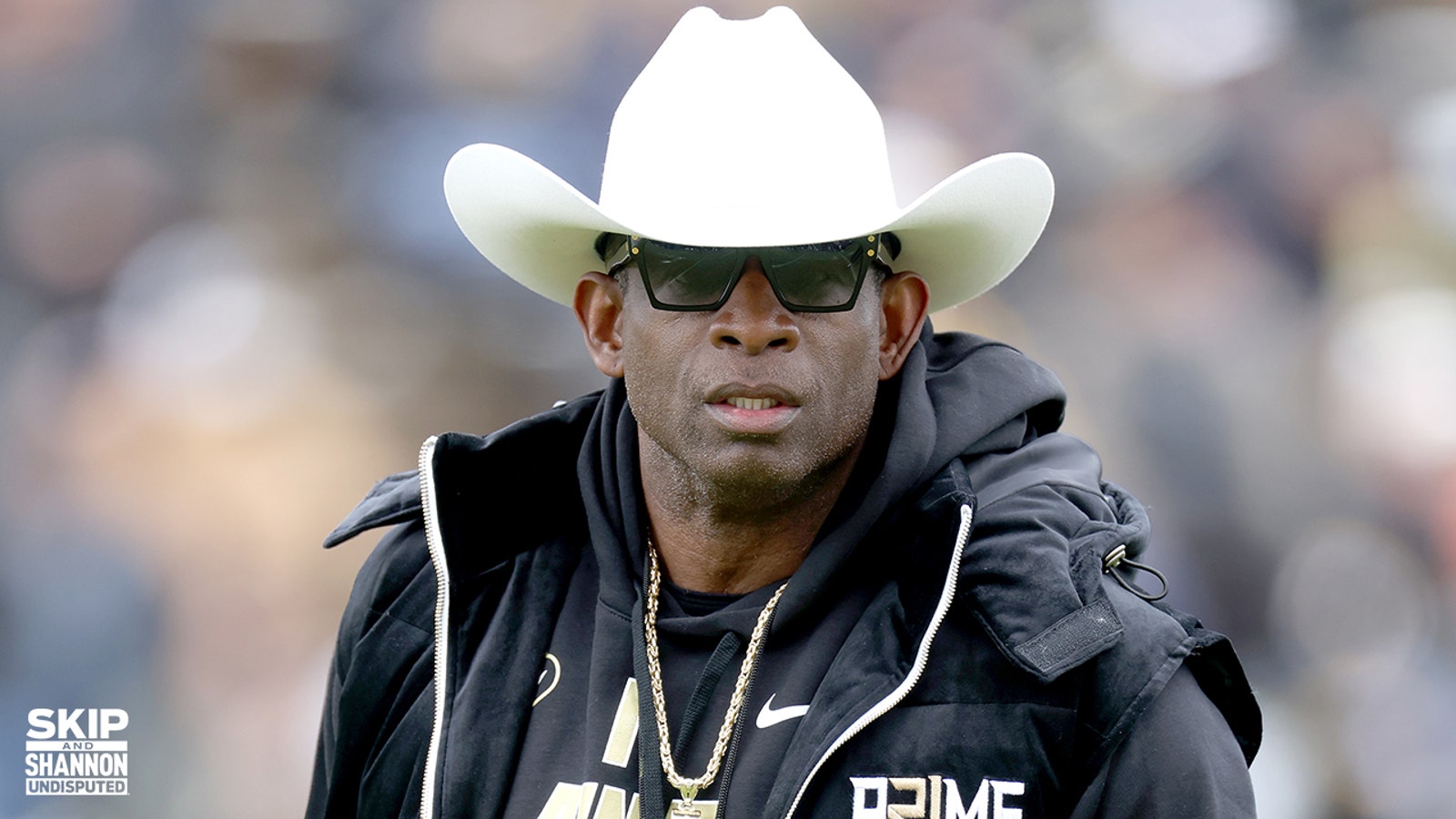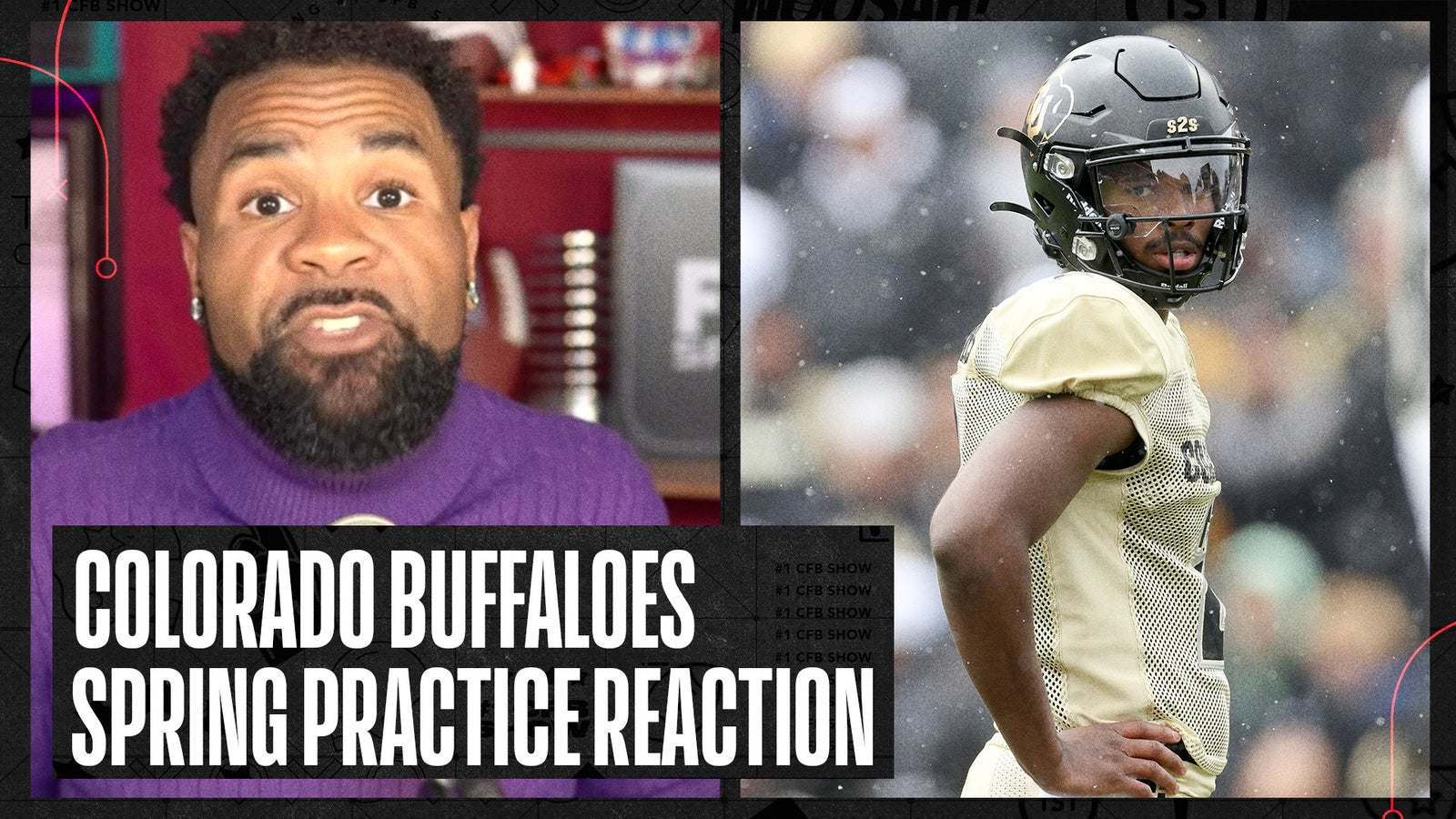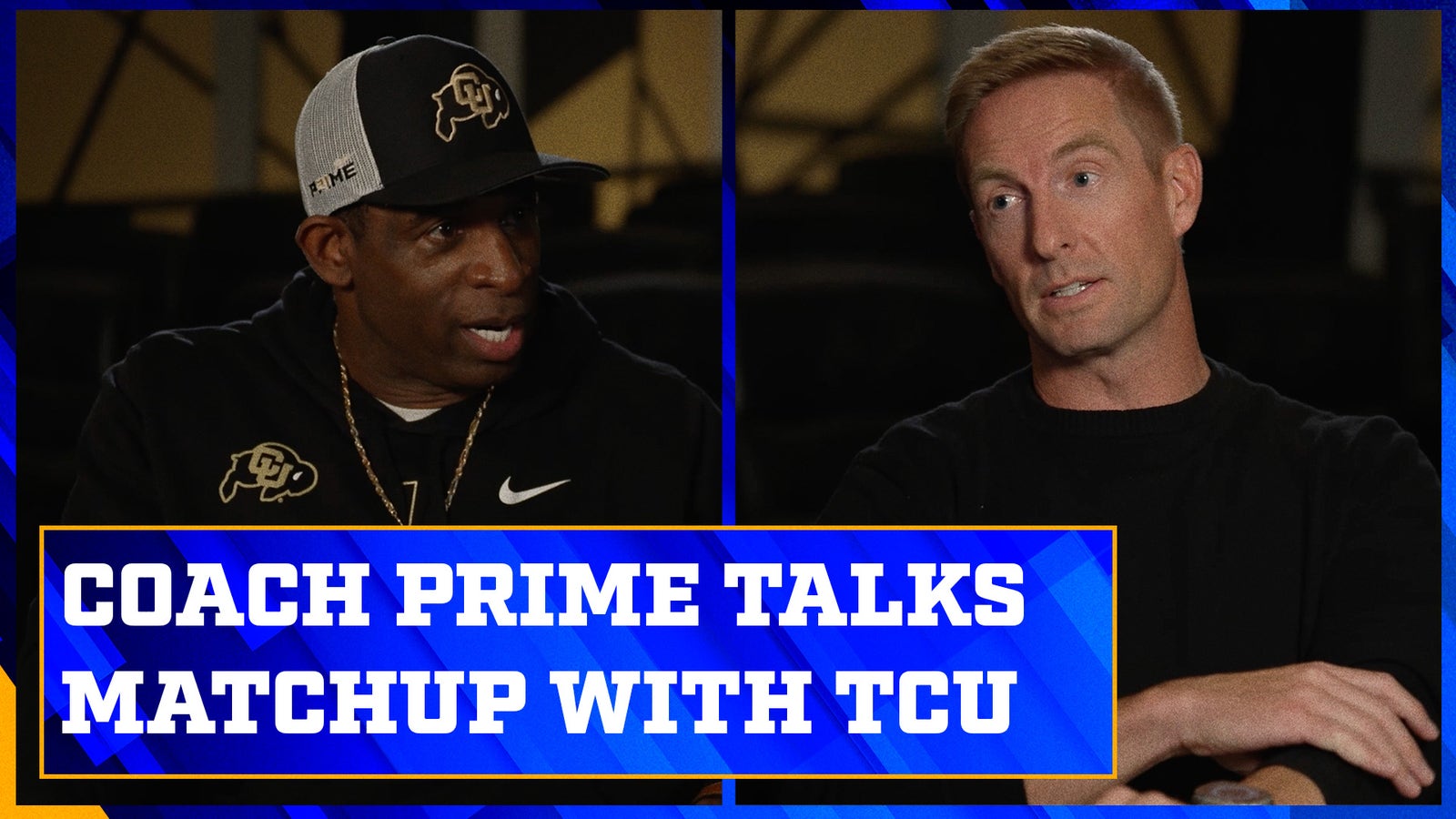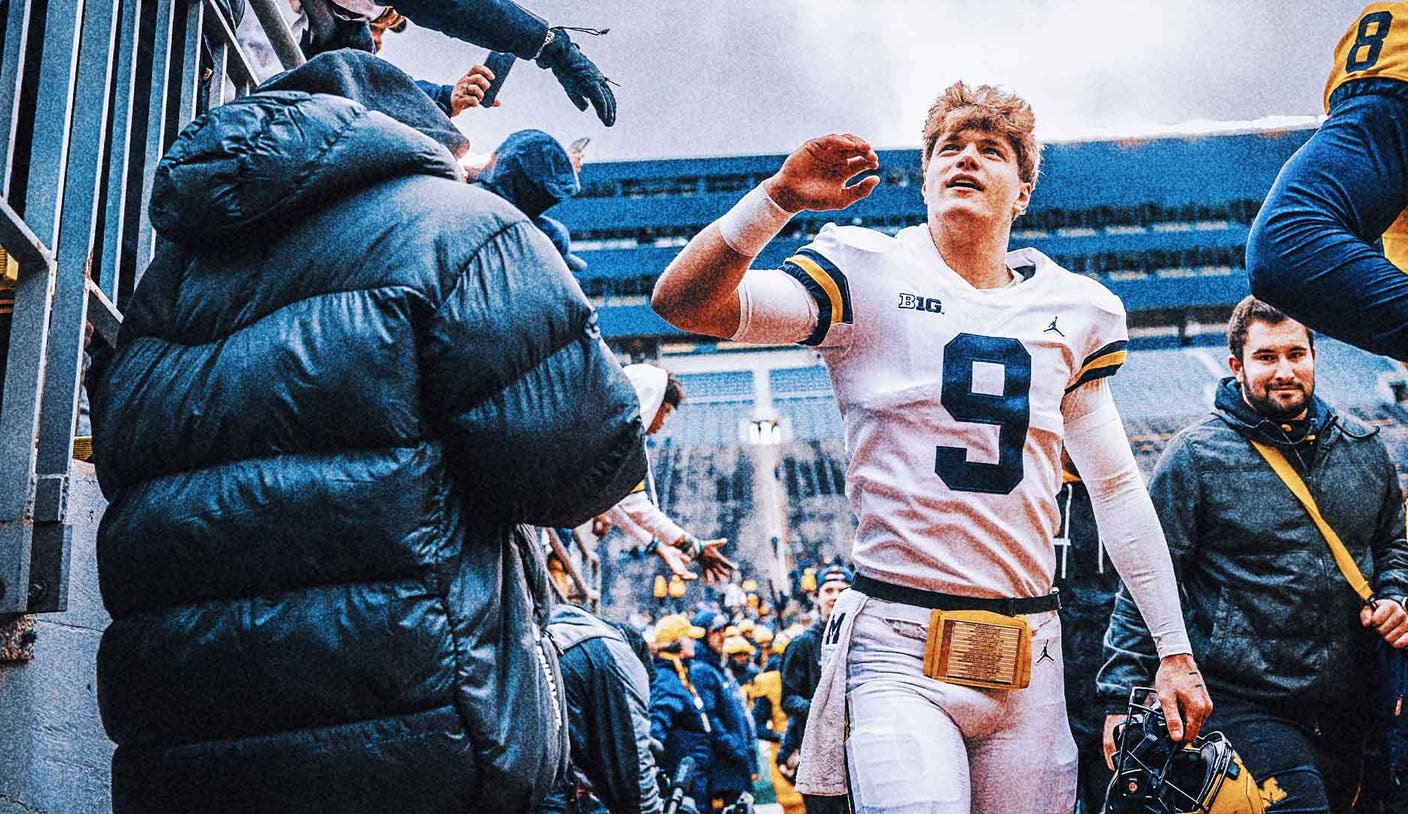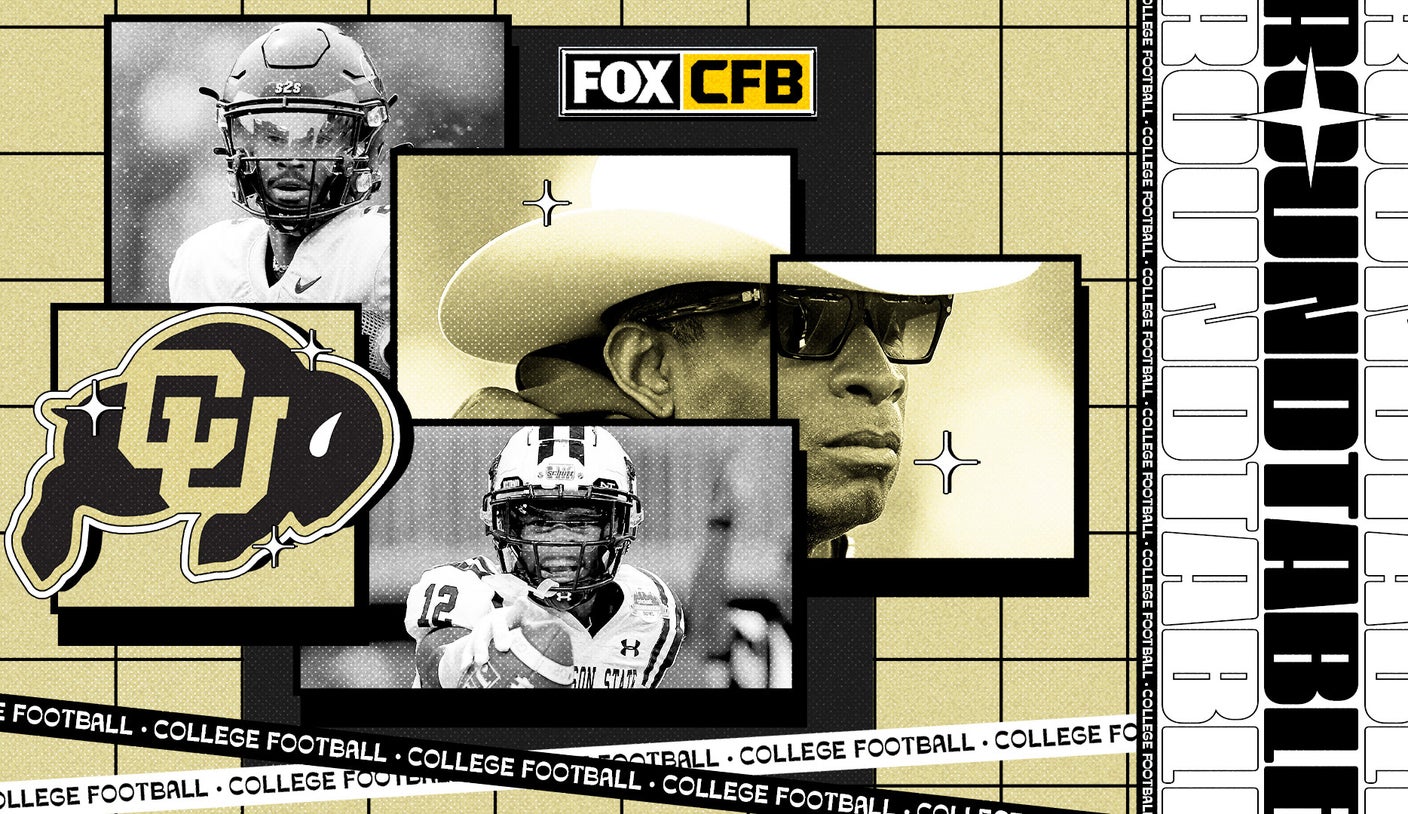
Across the Pac-12 — actually, across the sport of college football — the nation’s focus has been intensely focused on Deion Sanders as Coach Prime heads into his first season as a coach at the Power 5 level with the Colorado Buffaloes.
And how could it not be? The former NFL star has always been brash and has never shied away from attention. His roster-building methods have drawn criticism from some colleagues, and his aggressive plans have drawn the support of many bettors in Las Vegas. Even his personal health issues have been in the news — he will miss Pac-12 media day due to surgeries related to his blood clot issues.
Perhaps most intriguing of all, nobody seems to know exactly what to expect when his Buffaloes actually take the field this fall.
That’s where we can help. How good can the Buffs be in Year 1 under Sanders? Will QB Shedeur Sanders be a star? And what exactly will qualify as a successful season? FOX Sports college football experts RJ Young, Michael Cohen and Bryan Fischer are here to weigh in on all of it.
Given all the hype surrounding Deion Sanders’ move from Jackson State to Colorado, where he’s turned the program on its head, the simplest question might be the most difficult to answer: What will constitute a successful first season for Sanders as head coach of the Buffaloes?
Bryan Fischer: It feels like getting to a bowl game is going to be the win/loss mile marker everybody uses for this initial foray into the FBS ranks for Sanders and Colorado. While expectations internally are doubtless much higher in Boulder given all the roster turnover and general approach the staff takes, getting to .500 in such a daunting Pac-12 this season feels about right. Get to the postseason, and then you can use that as a springboard to a 2024 campaign that won’t be seeing you go up against the national runners-up from last year, the reigning Heisman Trophy winner, or the likes of experienced quarterbacks like Bo Nix before the calendar even reads October.
Speaking more broadly though, success in my mind will also be about putting the program back in a positive light. It’s not stepping out of line to say that this was one of the worst teams in the Power 5 the past few years when you factor in talent level and overall record. If Sanders can get the general discussion in the college football ecosystem to turn away from all the roster-rebuilding talk (or any antics detractors are highlighting) to what is happening between the lines in Boulder, that’s a huge win in itself. In fact, it’s paramount to this grand experiment under the Flat Irons actually working long term and not becoming a flash in the pan we all point to as a cautionary tale.
Finally, I would also hope that Coach Prime is also able to learn how to win even in a loss. This is not somebody who has experienced a lot of losing as either a player or a coach, but will have to get used to something that is inevitable at the Power 5 level for pretty much every leader not named Nick Saban or Kirby Smart. How will Sanders handle the moments when his team doesn’t play well? How will he handle injuries or setbacks? How do you use this season — regardless of the number of wins — to help ensure a successful offseason and, eventually, a 2024 run that can start to reach those goals set out upon his hiring?
Do all that, and I’d be ready to label this first season a success with the Buffs.
Michael Cohen: The efficacy of Sanders’ first season in Boulder can, and probably should, be evaluated across numerous facets of the program given how radical the changes have been since he arrived last December. The purest assessment will be made on the field, where Sanders will likely need to win at least four or five games to avoid an offseason of inquisitive headlines — not that he really cares what outsiders think anyway. But improving the Buffaloes from one win in 2022 to five wins, or perhaps more, would match or exceed every Colorado season since former head coach Mike MacIntyre went 10-4 in 2016. And that would be an incredible on-field result considering the non-conference schedule includes two Power 5 opponents in TCU and Nebraska.
Some of the other areas that will be examined focus more on the culture and atmosphere Sanders is building within the program. College coaches and administrators across the country are viewing the Buffaloes as a case study for widespread roster turnover to get a better idea of how feasible Sanders’ groundbreaking approach really is. Are the players getting along? Can a locker room with dozens of new faces be cohesive? Are there any off-field consequences of speed-dating so many players from the transfer portal? How many of Sanders’ players stick around for Year 2 of his project? Does Sanders dump a good chunk of his roster if the talent level isn’t what he’d hoped for?
These are the types of questions that can only be answered over time, and there are plenty of people both inside and outside the sport who are eagerly awaiting the results.
RJ Young: Colorado essentially hasn’t finished with a winning season since 2016 when the program went 10-4. I say essentially because the Buffs finished 4-2 in 2020, but that’s a junk statistical year for most, especially those who didn’t reach 12 games played. Without the COVID season, the Buffs have been bowl-eligible (six wins or more) just once since 2007.
But all of these benchmarks miss the point, which is that FOX Sports has dedicated this roundtable story to a program that finished 1-11 last year because Prime is present.
The point is Colorado sold out its season tickets for the first time in 27 years because Prime is present.
The point is coaches from the ACC, Big 12, Big Ten, SEC and Pac-12 will all have to take on questions about what’s going on in Boulder, Colorado because Prime is present.
The point is CU has 2024 commits from twice as many four-stars as it had in 2021 and 2022 combined because Prime is present.
So this question is best answered by Prime himself, and while he’s never going to put a number on success, suffice it to say he has won back-to-back conference championships at a school most had never heard of and a program that is as far away from elite as Inglewood is from Ireland. And he expects to close that very same gap at Colorado in a hurry.
Sanders’ son, Shedeur Sanders, is expected to step in and start at quarterback after two incredibly successful seasons as the No. 1 signal-caller at Jackson State. Is it reasonable to believe Shedeur Sanders can have immediate success? Are there any aspects of his game that concern you when translated to a Power 5 league?
Michael: Projecting what Sanders will or won’t do at Colorado is a task made difficult by the significant jump in talent from the FCS to the FBS level, both in terms of the players Sanders played with and the ones he played against. Many of his teammates in Boulder and the defenders he’ll face in the Pac-12 are likely to be bigger, stronger and faster than who he was surrounded by at Jackson State. But Sanders was a highly rated prospect for a reason coming out of high school — a four-star recruit rated No. 247 overall and the No. 26 quarterback, according to the 247Sports Composite — and held scholarship offers from Alabama, Florida, Florida State, Georgia, LSU, Michigan, Oregon, Tennessee and UCLA, among others. It’s clear that Power 5 coaches thought the Texas native could play.
After mining the Pro Football Focus data from Sanders’ final season at Jackson State, where he threw for 3,732 yards and 40 touchdowns, it’s worth highlighting a few advanced metrics that can eventually be compared to his 2023 performance. Of the 11 FBS and FCS quarterbacks with at least 550 dropbacks last season, Sanders ranked ninth in PFF’s subjective “Big Time Throws” metric that measures “a pass with excellent ball location and timing, generally thrown further down the field and/or into a tighter window.” Sanders’ total of 17 “Big Time Throws” was well behind the likes of North Carolina’s Drake Maye (45, most in the nation), USC’s Caleb Williams (32, third nationally) and Washington’s Michael Penix Jr. (27, fifth nationally). Sanders also ranked eighth in average depth of target at 7.6 yards per attempt, with Maye and Penix leading the nation at 10.4 and 10.1 yards per attempt, respectively.
Yet in terms of adjusted completion percentage, which measures the percentage of aimed passes thrown on target without penalizing quarterbacks for drops, Sanders was second in the country ahead of every Power 5 quarterback at 81.4%.
Taken together, a few conclusions can be drawn from these statistics: 1) that Sanders’ primary targets generally ran short and intermediate routes rather than stretching the field vertically 2) that his receivers generally created enough separation to where Big Time Throws were unnecessary because of how open they were and 3) that Sanders rarely missed an open receiver and routinely put his passes right where they needed to be.
How those numbers change, or don’t, against Power 5 competition will be an interesting lens through which to view Sanders’ first season in Boulder.
RJ: Last year only three quarterbacks threw for 3,500 yards, 40 TDs and six or fewer INTs across the FBS and FCS.
One was USC’s Williams, who won the Heisman on a team that couldn’t even reach the College Football Playoff.
Another was former Ohio State QB CJ Stroud, who nearly collected the dog collar off defending national champion Georgia and was selected No. 2 overall in the NFL Draft three months later.
The last is Shedeur Sanders. My concern isn’t about the quality Colorado has at quarterback. My concern is that so many have already sought to doubt his effectiveness based on past results.
Somehow, comparing a former FCS QB (Trey Lance) with worse numbers on a better team (North Dakota State) was fine when talking about how favorably he compared to former Ohio State QB and Heisman finalist Justin Fields. But for whatever reason, many have chosen to say Shedeur can’t repeat his performance against a Power 5 schedule? That sentiment is ignorant at-best, hypocritical on its face, and pushing a negative agenda toward the biggest story in the sport.
Bryan: Immediate success can be a lot of things, but based on the system they’re running at Colorado, it wouldn’t shock me in the least if the young Sanders winds up having similar numbers to what he had at the FCS level. Between being behind in games more often to running at a high tempo in OC Sean Lewis’ offense, the Buffs’ signal-caller is going to throw and throw some more to keep his team in games this season.
My biggest area of concern is going to be how he adjusts to windows just closing faster than they did at Jackson State.
Sanders is going to go from facing maybe one or two players who might have a shot at the next level every week to routinely facing four or five every game who will be in the NFL next year (and a handful of younger players who will join them down the road). Previously wide-open receivers won’t be running free like they were for his first two seasons, and opposing defensive coordinators are going to design some coverages that are going to bait him into throwing where he shouldn’t be throwing on certain plays. Taking all that in, correcting mistakes and becoming a better quarterback will be musts if he’s going to succeed to a level where 2023 is looked at as a successful run.
It goes without saying that standing up to the increased physical nature of playing in the Power 5 is something to be a tad concerned with as well.
Despite the immediate recruiting splashes of landing five-star cornerback Cormani McClain from the high school ranks and former five-star defensive back/wide receiver Travis Hunter via the transfer portal, the momentum hasn’t appeared to carry over into Colorado’s 2024 recruiting class. As of this week, the Buffaloes have just eight verbal commitments for 2024 in a class that ranks 60th nationally and sixth in the Pac-12. Should Colorado fans be worried?
RJ: I disagree. They have momentum in this present recruiting cycle and, no, Buffs fans shouldn’t be worried. In their 2024 class, the Buffs already boast commitments from two four-star players. That’s twice as many as they had in their 2021 and 2022 classes combined.
But Prime has never focused on putting together a strong class of high school recruits. His ideal roster split includes just 17 high school recruits each cycle. The other 80% of the roster is made up of transfers and graduate transfers.
Along with McClain, Hunter, Shedeur Sanders and Shiloh Sanders, he’s also added Alton McCaskill — a brilliant win for Prime and company.
McCaskill, a former four-star RB, accounted for more than 1,000 yards from scrimmage on 210 touches with 18 TDs as a freshman at Houston. Had he not blown out the anterior cruciate ligament in his knee, he would’ve been a top-half of the NFL Draft prospect at the position.
The Buffaloes also added four-star RB Dylan Edwards in their 2023 class. But this isn’t the point. The point is Prime began coaching college football in the age of the transfer portal and the advent of name, image and likeness. He hasn’t had to adapt to these ideas because he’s never known anything else as a head coach. It’s others who have had to adapt, waste time learning what works, and then setting a new strategy in place.
Bryan: Nope. Although recruiting is a bigger deal in the summer than it once was because of the ability to host official visits earlier, I wouldn’t be completely worried if I was a Buffs fan because you have a head coach who appears to be one of the great closers in the game. This is always going to be something that’s fluid given how fickle kids are nowadays, but the fact that he’s already gotten multiple four-star, top 300-type prospects in the fold for 2024 is actually something that would be fairly encouraging moving forward.
Sanders is always going to dip heavily into the transfer portal, too, and that is another aspect you have to consider when you factor in the overall talent level being brought to Boulder.
Michael: To some extent, Colorado’s middling 2024 recruiting ranking is a result of quality over quantity. Commitments from a pair of four-star prospects in athlete Aaron Butler (No. 65 overall, No. 5 athlete) and defensive lineman Brandon Davis-Swain (No. 265 overall, No. 29 D-line) have given the Buffaloes an average prospect score of 89.46 near the midway point of the cycle. That number is a significant uptick from Sanders’ first recruiting class, which finished with an average prospect score of 87.57 overall.
What might give Colorado fans some pause — but not necessarily concern — is the lower number of total commitments, which is the second-smallest class in the Pac-12, ahead of only Utah (seven), and well behind league leaders Stanford (28) and Oregon (20). Two potential questions come to mind: 1) Are certain high school recruits and their parents wary of committing to Colorado after seeing how quickly Sanders discarded most of the players he inherited? Depending on how the 2023 season unfolds, Sanders could make significant changes next winter and spring if he feels the need to course correct after speedily constructing this year’s team. 2) Did Colorado swing too big with the prospects Sanders and his staff identified in the 2024 cycle? From March 23 through mid-June, the Buffaloes welcomed 14 blue-chip prospects to campus for either official or unofficial visits, according to the recruiting website On3. Two of those players — Butler and Davis-Swain — are now committed to Colorado, but seven of the others are verbally committed to other programs.
The transfer portal will always be there for Sanders to supplement his roster — and he’s quickly become one of the most persuasive and aggressive coaches in college football — but how strongly he completes his 2024 class might offer a window into how he’s being received by high schoolers and their parents in living rooms across the country.
RJ Young is a national college football writer and analyst for FOX Sports and the host of the podcast “The Number One College Football Show.” Follow him on Twitter at @RJ_Young and subscribe to “The RJ Young Show” on YouTube.
Michael Cohen covers college football and basketball for FOX Sports with an emphasis on the Big Ten. Follow him on Twitter at @Michael_Cohen13.
Bryan Fischer is a college football writer for FOX Sports. He has been covering college athletics for nearly two decades at outlets such as NBC Sports, CBS Sports, Yahoo! Sports and NFL.com among others. Follow him on Twitter at @BryanDFischer.
COLLEGE FOOTBALL trending

Get more from College Football Follow your favorites to get information about games, news and more
